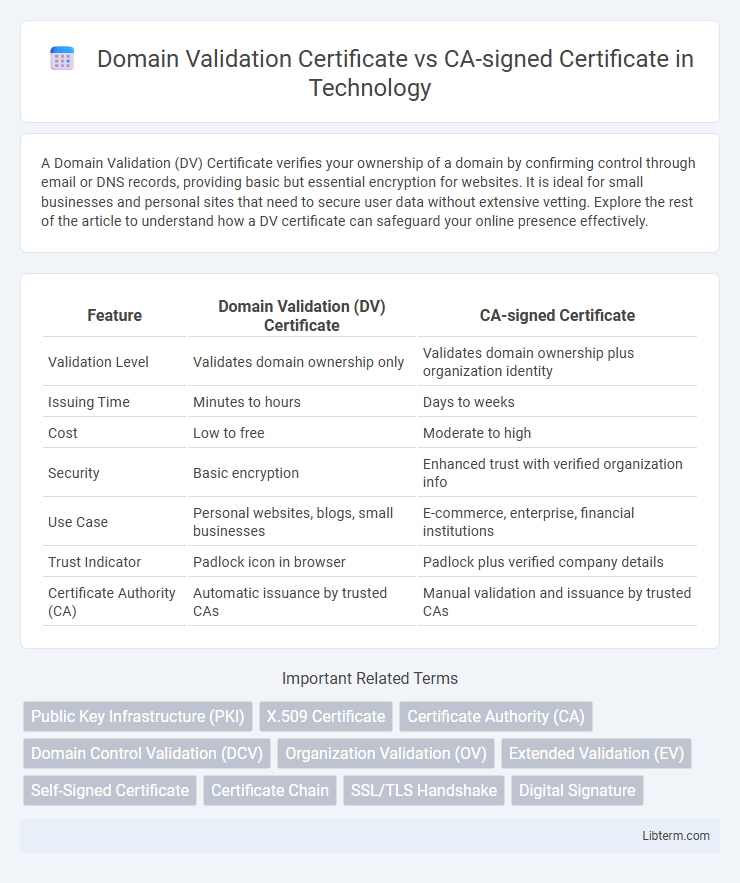A Domain Validation (DV) Certificate verifies your ownership of a domain by confirming control through email or DNS records, providing basic but essential encryption for websites. It is ideal for small businesses and personal sites that need to secure user data without extensive vetting. Explore the rest of the article to understand how a DV certificate can safeguard your online presence effectively.
Table of Comparison
| Feature | Domain Validation (DV) Certificate | CA-signed Certificate |
|---|---|---|
| Validation Level | Validates domain ownership only | Validates domain ownership plus organization identity |
| Issuing Time | Minutes to hours | Days to weeks |
| Cost | Low to free | Moderate to high |
| Security | Basic encryption | Enhanced trust with verified organization info |
| Use Case | Personal websites, blogs, small businesses | E-commerce, enterprise, financial institutions |
| Trust Indicator | Padlock icon in browser | Padlock plus verified company details |
| Certificate Authority (CA) | Automatic issuance by trusted CAs | Manual validation and issuance by trusted CAs |
Introduction to Domain Validation (DV) and CA-signed Certificates
Domain Validation (DV) Certificates verify domain ownership through automated processes without requiring extensive business validation, making them ideal for quickly securing websites. CA-signed Certificates, issued by trusted Certificate Authorities, undergo rigorous identity verification to establish organizational legitimacy and enhance user trust. These certificates enable encrypted communication via SSL/TLS protocols, with CA-signed Certificates providing higher assurance levels compared to DV Certificates.
What is a Domain Validation Certificate?
A Domain Validation (DV) Certificate is a type of SSL certificate that verifies the ownership of a domain by confirming control over the domain name, typically through email or DNS record validation. Unlike Organization Validation (OV) or Extended Validation (EV) certificates, DV certificates do not provide details about the company or entity behind the website, making them quicker and easier to obtain. Issued by Certificate Authorities (CAs), DV certificates encrypt data between the user's browser and the website, ensuring secure communications without extensive identity verification.
Overview of Certificate Authority (CA)-Signed Certificates
Certificate Authority (CA)-signed certificates are digital certificates issued by a trusted third-party entity that verifies the identity of the certificate requester before issuance. These certificates provide a higher level of security and trust compared to Domain Validation (DV) certificates, as CAs perform rigorous validation processes, including organizational and extended validations. CA-signed certificates are essential for enabling HTTPS, securing data transmission, and establishing credibility for websites and online services.
Key Differences: DV Certificates vs. CA-signed Certificates
Domain Validation (DV) Certificates verify domain ownership through automated methods, providing basic encryption with rapid issuance, ideal for small websites and blogs. CA-signed Certificates, including Organization Validation (OV) and Extended Validation (EV) types, involve thorough identity verification by Certificate Authorities, enhancing trust and enabling stronger authentication for e-commerce and enterprise platforms. Key differences lie in the validation rigor, issuance speed, and the level of trust signaled to end users, with CA-signed Certificates offering higher assurance and visibly validated organizational information.
Authentication Processes Compared
Domain Validation (DV) Certificates verify control of a domain using automated checks such as email validation or DNS record verification, offering basic authentication quickly and with minimal human intervention. CA-signed Certificates, including Organization Validation (OV) and Extended Validation (EV), require more rigorous identity verification processes involving manual checks of the organization's legitimacy and legal status by the Certificate Authority (CA). The enhanced authentication of CA-signed Certificates provides stronger assurance to users about the entity behind the website, crucial for trust in e-commerce and sensitive transactions.
Security Levels and Trust Indicators
Domain Validation (DV) Certificates offer basic encryption and verify domain ownership through automated processes, providing essential security for smaller websites but limited identity assurance. CA-signed Certificates, especially Organization Validation (OV) and Extended Validation (EV), undergo rigorous checks on the organization's legitimacy, enhancing trust indicators like company name display in browsers and green address bars. Higher security levels in CA-signed Certificates reduce phishing risks and foster user confidence by confirming verified ownership and organizational authenticity.
Use Cases for DV Certificates
Domain Validation (DV) Certificates are primarily used for websites requiring basic encryption and quick validation, such as personal blogs, informational sites, and small business pages. They offer a swift issuance process by verifying domain ownership only, making them ideal for websites without the need for extensive organization authentication. DV Certificates enable secure HTTPS connections, ensuring user data protection and boosting visitor trust in low-risk environments.
When to Choose a CA-signed Certificate
Choose a CA-signed certificate when your website demands higher trust, such as e-commerce sites or platforms handling sensitive customer data. These certificates provide enhanced validation by a trusted Certificate Authority, improving user confidence and enabling features like Extended Validation (EV) or Organization Validation (OV). Opt for CA-signed certificates to meet compliance standards and ensure stronger encryption and authentication for business-critical applications.
Cost and Issuance Time Considerations
Domain Validation (DV) Certificates typically cost less and can be issued within minutes due to automated validation processes, making them ideal for quick deployment and budget-sensitive projects. CA-signed Certificates, especially Organization Validation (OV) or Extended Validation (EV) types, involve a more rigorous identity verification process, resulting in higher costs and issuance times ranging from hours to several days. Businesses seeking fast and affordable SSL solutions often opt for DV Certificates, while those requiring enhanced trust and brand assurance invest in CA-signed OV or EV Certificates despite the longer issuance period.
Which SSL Certificate Is Right for You?
A Domain Validation (DV) Certificate offers basic encryption by verifying domain ownership, making it ideal for small websites and blogs seeking quick, cost-effective security. CA-signed Certificates, such as Organization Validation (OV) or Extended Validation (EV), provide higher trust levels through thorough business identity verification, suited for e-commerce sites and enterprises handling sensitive customer data. Choosing the right SSL certificate depends on your website's security needs, user trust requirements, and budget constraints.
Domain Validation Certificate Infographic

 libterm.com
libterm.com